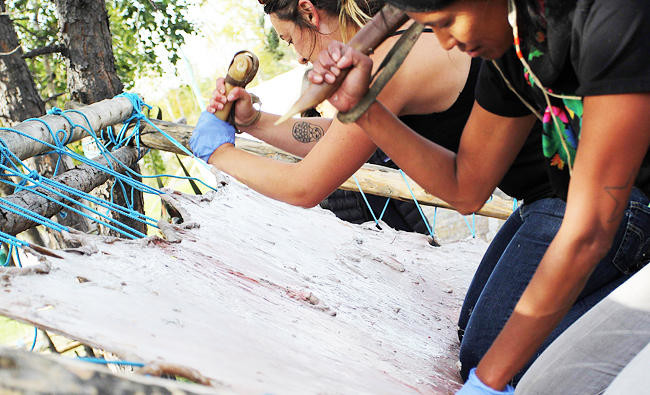TORONTO: The Canadian government has agreed to pay compensation to indigenous people who were taken from their homes and adopted into non-indigenous families.
Indigenous Relations Minister Carolyn Bennett announced the settlement Friday in what’s known as the “Sixties Scoop.” Indigenous children were robbed of their cultural identities by being placed with non-native families by child welfare services during the 1960s, 1970s and 1980s. Many lost touch with their culture and language.
The settlement for an estimated 20,000 people is aimed at resolving numerous related lawsuits. The victims will share 750 million Canadian dollars ($596 million), with individual amounts to be determined later. Many said they expected a settlement of around 50,000 Canadian dollars each.
Lead plaintiff Marcia Brown Martel, who was taken by child welfare officials and adopted by a non-native family, called events the “stealing of children.”
“I have great hope that because we’ve reached this plateau that this will never, ever happen in Canada again,” said Brown Martel, who was placed in the foster system as a child and suffered emotional, physical and sexual abuse.
Many had mixed emotions about the settlement.
“I had no idea I was native until I was a teenager,” Colleen Cardinal told The Associated Press. Cardinal was taken from her biological family at the age of two in Alberta and adopted into a non-indigenous family in Ontario along with her two older sisters. She said her sisters were sexually molested by their adopted father.
“There were ongoing attempts to assimilate our people into the mainstream culture,” she said, adding that the settlement doesn’t amount to much.
“It’s quite disappointing,” she said. “It’s quite low. It should be CA$80,000 or $100,000. A lot of us were taken out of the province, out of the country, taken so far away from our families.” Cardinal now lives with post-traumatic stress disorder. But she said she’s now happy and is the co-founder and coordinator of the National Indigenous Survivors of Child Welfare Network.
Ontario Superior Court Justice Edward Belobaba ruled in February that Canada had breached its “duty of care” to the children and found the government liable.
A tearful Bennett, the government minister, said she couldn’t understand how it was allowed to happen.
“I don’t know what people were thinking,” she said.
The settlement package also includes up to 50 million Canadian dollars for a healing and reconciliation foundation.
The agreement is a “first step” in resolving Sixties Scoop litigation, Bennett added, noting the federal government is committed to working with other indigenous peoples affected.
The Sixties Scoop echoes the history of residential schools in Canada.
Some 150,000 First Nations, Inuit and Metis children were taken from their families over much of the last century and put in government schools, where they were forced to convert to Christianity and not allowed to speak their native languages. Many were beaten and verbally abused, and up to 6,000 are said to have died.
Canada’s previous prime minister made a historic apology in 2008 to residential school survivors.
Canada pays indigenous people taken from their homes
Canada pays indigenous people taken from their homes

India inks 10-year deal to operate Iran’s Chabahar port

- India developing port to bypass Pakistan in bid to transport goods to Iran, Afghanistan and Central Asia
- Washington says US sanctions on Iran “remain in place,” warns countries they will be imposed
NEW DELHI: India signed a 10-year contract with Iran on Monday to develop and operate the Iranian port of Chabahar, the Narendra Modi-led government said, strengthening relations with a strategic Middle Eastern nation.
India has been developing the port in Chabahar on Iran’s south-eastern coast along the Gulf of Oman as a way to transport goods to Iran, Afghanistan and central Asian countries, bypassing the port of Karachi and Gwadar in its rival Pakistan.
US sanctions on Iran, however, slowed the port’s development.
“Chabahar Port’s significance transcends its role as a mere conduit between India and Iran; it serves as a vital trade artery connecting India with Afghanistan and Central Asian Countries,” India’s Shipping Minister Sarbananda Sonowal said in Tehran, after the signing of the agreement.
“This linkage has unlocked new avenues for trade and fortified supply chain resilience across the region.”
US State Department deputy spokesperson Vedant Patel, asked about the deal, told reporters that US sanctions on Iran remain in place and warned that Washington will continue to enforce them.
“Any entity, anyone considering business deals with Iran — they need to be aware of the potential risks that they are opening themselves up to and the potential risk of sanctions,” Patel told reporters.
The long-term deal was signed between Indian Ports Global Limited (IPGL) and the Port & Maritime Organization of Iran, authorities in both countries said.
Under the agreement, IPGL will invest about $120 million while there will be an additional $250 million in financing, bringing the contract’s value to $370 million, said Iranian Minister of Roads and Urban Development Mehrdad Bazrpash.
IPGL first took over operations of the port at the end of 2018 and has since handled container traffic of more than 90,000 TEUs and bulk and general cargo of more than 8.4 million tons, an Indian government official said.
A total of 2.5 million tons of wheat and 2,000 tons of pulses have been shipped from India to Afghanistan through Chabahar Port, the official added.
“It will clear the pathway for bigger investments to be made in the port,” Indian Foreign Minister Subrahmanyam Jaishankar told reporters in Mumbai on Monday.
Blinken in Ukraine on unannounced visit to show US support

- Blinken arrived by overnight train from Poland and was due to meet with Ukrainian President Volodymyr Zelensky
Marking his fourth visit to Kyiv since the start of the Russian invasion in February 2022, Blinken arrived by overnight train from Poland and was due to meet with Ukrainian President Volodymyr Zelensky, according to an AFP journalist accompanying him.
The visit comes just weeks after the US Congress finally approved a $61 billion package of financial aid for Ukraine after months of political wrangling, unlocking much-needed arms for the country’s stretched troops.
The aid is expected to flow at an accelerated pace as Washington seeks to make up for lost months while Congress struggled to agree on assistance.
“First this trip is to send a strong signal of reassurance to the Ukrainians who are obviously in a very difficult moment both with grinding battle on the Eastern Front but also with the Russians now expanding some cross-border attacks into Kharkiv,” a senior US official who spoke on condition of anonymity told reporters aboard the train.
The secretary intends in particular to detail how US aid will “be executed in a fashion to help shore up their defenses and enable them to increasingly take back the initiative on the battlefield.”
The last visit by a senior US official was in March, when National Security Adviser Jake Sullivan went to Ukraine.
Russia is “clearly throwing everything they have in the east and expanding the fighting to Kharkiv is representative of that strategy,” the official said.
“But we have a lot of confidence that the Ukrainians will increasingly be effective in pushing the Russians back as our assistance flows in both from the United States and other allies and partners.”
In addition to holding talks with Zelensky, Blinken is expected to meet with his counterpart Dmytro Kuleba as well as members of the civil society and additionally deliver a speech focused on “Ukraine’s strategic success.”
Also up for discussion is a bilateral defense agreement that the United States hopes to conclude before the NATO summit in Washington in July.
“The negotiations are in their final stages, we’re very close,” the US official said.
Biden signs ban on imports of Russian nuclear reactor fuel into law

- Russia is the world’s top supplier of enriched uranium, and about 24 percent of the enriched uranium used by US nuclear power plants come from the country
WASHINGTON: President Joe Biden signed a ban on Russian enriched uranium into law on Monday, the White House said, in the latest effort by Washington to disrupt President Vladimir Putin’s invasion of Ukraine.
The ban on imports of the fuel for nuclear power plants begins in about 90 days, although it allows the Department of Energy to issue waivers in case of supply concerns.
Russia is the world’s top supplier of enriched uranium, and about 24 percent of the enriched uranium used by US nuclear power plants come from the country.
The law also unlocks about $2.7 billion in funding in previous legislation to build out the US uranium fuel industry.
“Today, President Biden signed into law a historic series of actions that will strengthen our nation’s energy and economic security by reducing, and ultimately eliminating, our reliance on Russia for civilian nuclear power,” Jake Sullivan, the national security adviser, said in a statement.
Sullivan said the law “delivers on multilateral goals we have set with our allies and partners,” including a pledge last December with Canada, France, Japan and the United Kingdom to collectively invest $4.2 billion to expand enrichment and conversion capacity of uranium.
The waivers, if implemented by the Energy Department, allow all the Russian uranium imports the US normally imports through 2027.
Police aim to break up pro-Palestine protests in Amsterdam

- The Eindhoven University of Technology confirmed that there were “dozens of students peacefully protesting outside next to ten to 15 tents”
AMSTERDAM: Police moved in to end a pro-Palestinian protest at the University of Amsterdam on Monday after protesters occupied university buildings in various Dutch cities to condemn Israel’s war in Gaza, ANP news agency reported.
Earlier on Monday, a Dutch protest group said it had occupied university buildings in the Dutch cities of Amsterdam, Groningen and Eindhoven.
In a post on social media site X, Amsterdam police said the university had filed a police report against the protesters for acts of vandalism.
Police made sure no one entered the university buildings and asked protesters to leave the premises voluntarily.
A spokesperson for the University of Amsterdam confirmed the occupation and said it had advised people not affiliated with the protest to leave the building.
The Eindhoven University of Technology confirmed that there were “dozens of students peacefully protesting outside next to ten to 15 tents.”
Students in the Netherlands have been protesting against Israel’s war in Gaza since last Monday and Dutch riot police had previously clashed with protesters at the University of Amsterdam.
Students in the US and Europe have also been holding mostly peaceful demonstrations calling for an immediate permanent ceasefire and for schools to cut financial ties with companies they say are profiting from the oppression of Palestinians.
Ukraine’s first lady and foreign minister visit Russia-friendly Serbia

- Although Serbia has condemned the Russian aggression on Ukraine, it has refused to join international sanctions against Moscow
BELGRADE, Serbia: Ukrainian Foreign Minister Dmytro Kuleba made a surprise visit to Russia-friendly Serbia on Monday, together with Ukraine’s first lady, Olena Zelenska, in a sign of warming relations between the two states.
On his first visit to Serbia since the start of the Russian aggression on Ukraine in 2022, Kuleba met Serbian President Aleksandar Vucic and new Serbian Prime Minister Milos Vucevic, whose government includes several pro-Russian ministers, including two who have been under US sanctions.
A statement issued by the prime minister’s office after the talks said that “Serbia is committed to respecting international law and the territorial integrity of every member state of the United Nations, including Ukraine.”
Although Serbia has condemned the Russian aggression on Ukraine, it has refused to join international sanctions against Moscow and has instead maintained warm and friendly relations with its traditional Slavic ally.
Serbia has proclaimed neutrality regarding the war in Ukraine, and its authorities repeat that Serbia does not supply weapons to any parties. However, there are reports that Serbia has delivered weapons to Ukraine through intermediary countries. The visit by Kuleba and Zelenska, who toured the Serbian capital with Serbian first lady Tamara Vucic on Sunday, was met with criticism in Moscow. Comments by readers in the Russian state-run media such as “shameful” were published by RIA Novosti.
In what appears to be damage control, soon after his talks with Kuleba on Monday, Vucevic was to meet the Russian ambassador to Belgrade and the two were to tour a big storage facility for Russian gas that is being imported to Serbia.
Pro-Russian President Vucic has informally met Ukrainian President Volodymyr Zelenskyy three times on the sidelines of international conferences. Serbia has supplied Ukraine with humanitarian and financial aid.
Vucic has for years claimed to follow a “neutral” policy, balancing ties among Moscow, Beijing, Brussels and Washington. Although he has repeatedly said that Serbia is firm on its proclaimed goal of seeking European Union membership, under his authoritarian rule the Balkan country appears to be shifting closer to Russia and especially China.
During a high-stakes visit by Chinese President Xi Jinping to Belgrade last week, China and Serbia signed an agreement to build “ironclad” relations and a “shared joint future.”

















